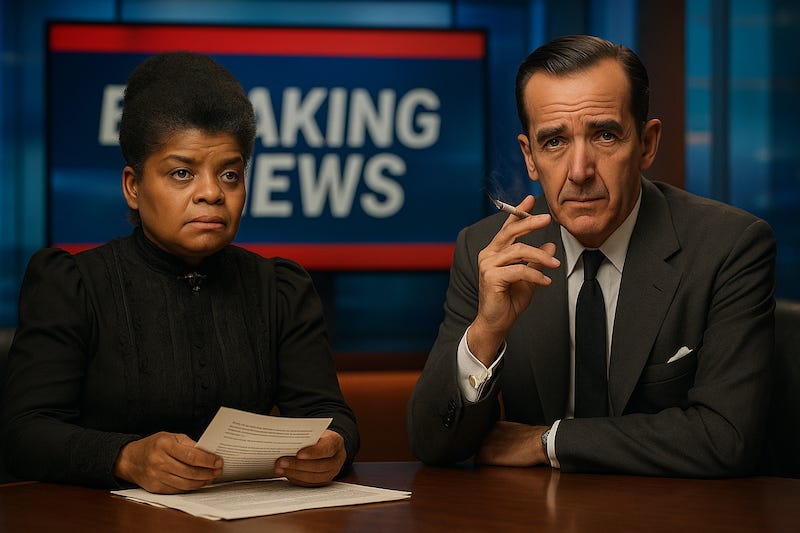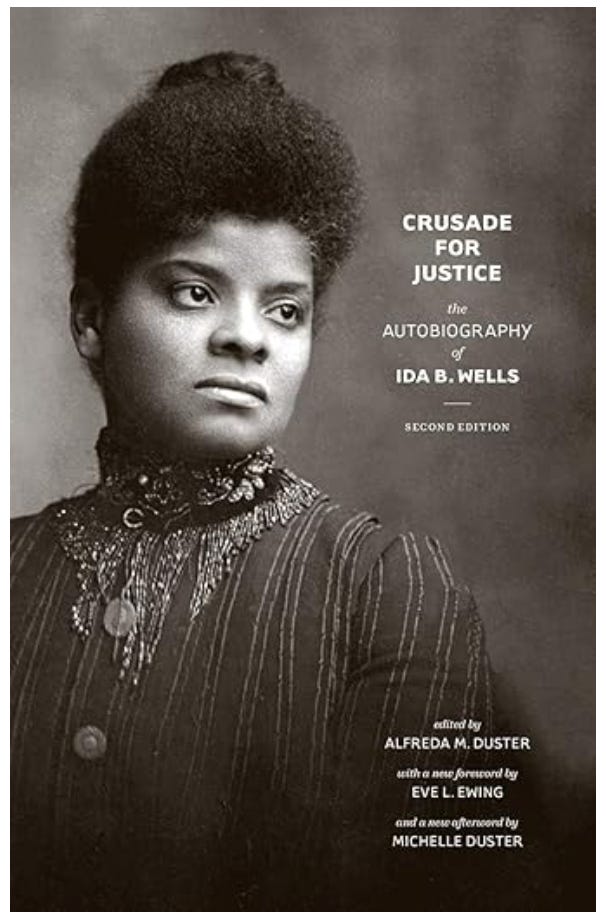Ida B. Wells & Edward R. Murrow on Truth in the Age of Disinformation
Transmission retrieved via ChronoTranscriptor™ – Channel locked between Chicago’s South Side and a dimly lit CBS newsroom.
[Host Introduction]
In today’s fragmented media landscape, where conspiracy theories spread faster than facts and trust in journalism has plummeted, we turn to two of history’s most principled truth-tellers: Ida B. Wells, the fearless anti-lynching journalist who faced down mobs with a pen, and Edward R. Murrow, the voice of reason who stood before the American people and challenged power with broadcast integrity.
They join ChronoTalks to explore the fight for facts in a world drowning in fiction.
[Interview Begins]
Host: Ms. Wells, Mr. Murrow—thank you both for being here. Today’s media landscape is overwhelmed with misinformation, distrust, and profit-driven spin. Where would either of you begin in restoring credibility to journalism?
Ida B. Wells: Start with courage. The kind that doesn’t flinch when the truth is unpopular—or dangerous. Too many modern outlets want to be liked. That’s not the job. The job is to expose what powerful people want hidden.
Edward R. Murrow: And to do it without spectacle. Journalism is not a reality show. The moment it becomes entertainment, it ceases to serve democracy.
I once said, “We cannot make good news out of bad practice.” That still holds. If you value access over honesty, you’re no longer a reporter. You’re a spokesperson.
Host: Much of the public now distrusts traditional media. How can journalists reach people who’ve tuned them out or turned to conspiracy?
Wells: By going where the people are—and staying there.
I wrote for Black newspapers because mainstream papers didn’t care about Black lives. I didn’t wait for an invitation to tell the truth. I made space.
If mainstream media wants trust back, it has to earn it. Not from pundits—but from the mothers, workers, teachers, and janitors who live the stories.
Murrow: Trust cannot be regained by louder branding. It is restored through consistency, clarity, and self-correction. If you report something wrong—say so. Don’t bury the correction on page twelve.
The public isn't expecting perfection. They’re looking for sincerity. And these days, sincerity is revolutionary.
Host: Today, we also have “bothsidesism”—the idea that presenting both viewpoints equally, no matter how distorted one is, is somehow fair journalism. Thoughts?
Murrow: That is not objectivity—it’s abdication. If one person says it’s raining and another says it’s not, the job of the journalist isn’t to quote them both. It’s to look out the damn window.
Balance does not mean false equivalence.
Wells (firmly): Exactly. When I reported on lynchings, I didn’t publish the murderers’ justifications to "balance" the story. I gave voice to the victims.
If you give equal airtime to lies, you legitimize them. That’s complicity.
Host: Social media platforms have become major distributors of disinformation. What role do they play in today’s journalism crisis?
Wells: They make it worse. But they didn’t invent the disease—they just sell it faster.
Truth-tellers must fight fire with facts—and community. We need networks of citizen journalists, local storytellers, elders, and youth. We cannot wait for Silicon Valley to grow a conscience.
Murrow: I’ve always believed the instrument—whether it’s radio, television, or Twitter—is neutral. It’s the hands behind it that decide whether it’s used for signal or for noise.
But platforms that profit from division are not neutral. They are part of the story.
Host: If you were starting your careers today, what would you do differently?
Murrow: I’d still wear the suit, but I’d buy more comfortable shoes—because I’d be walking into communities, not sitting in a studio. I’d create long-form, ad-free storytelling platforms. And I’d remind every viewer: journalism is what you deserve, not what you’re fed.
Wells: I’d bring back the Black press. Not just as a relic, but as a movement. We need journalism that doesn’t beg for clicks—but demands justice.
And I’d mentor the hell out of young women who are told to shrink their voices. We need them now more than ever.
Host: Final thoughts?
Murrow (quietly): We must not confuse dissent with disloyalty. And we must not confuse virality with truth.
Wells: Journalism is not a career—it’s a calling. If you’re not willing to lose comfort, friends, or sponsors over it, you’re not in the fight.
[Closing]
In an era when reality itself is contested, ChronoTalks reminds us of a simple truth: facts still matter, but they must be fought for. With pens. With voices. With integrity.
Next week, we speak with George Orwell and Margaret Atwood on surveillance, narrative control, and the war on language.
Until then—ask harder questions, and never forget whose stories get erased first.
Ida B. Wells stands as an enduring American icon of truth and justice. Born into slavery, she rose to become a pioneering investigative journalist, a fierce opponent of lynching, and a relentless advocate for voting rights—both for women and African Americans. A founding member of the NAACP and the founder of the Alpha Suffrage Club in Chicago, Wells was a formidable force in the early civil rights movement. She worked alongside towering figures such as W. E. B. Du Bois, Madam C. J. Walker, Mary Church Terrell, Frederick Douglass, and Susan B. Anthony.
Originally published in 1970, this powerful memoir offers a vivid portrait of Wells’s extraordinary public life as a teacher, lecturer, and journalist, as well as her deeply personal journey as a mother and woman determined to make change. This updated edition features a new foreword by scholar and writer Eve L. Ewing, rare archival images, and a moving afterword by Wells’s great-granddaughter, Michelle Duster. More information…




